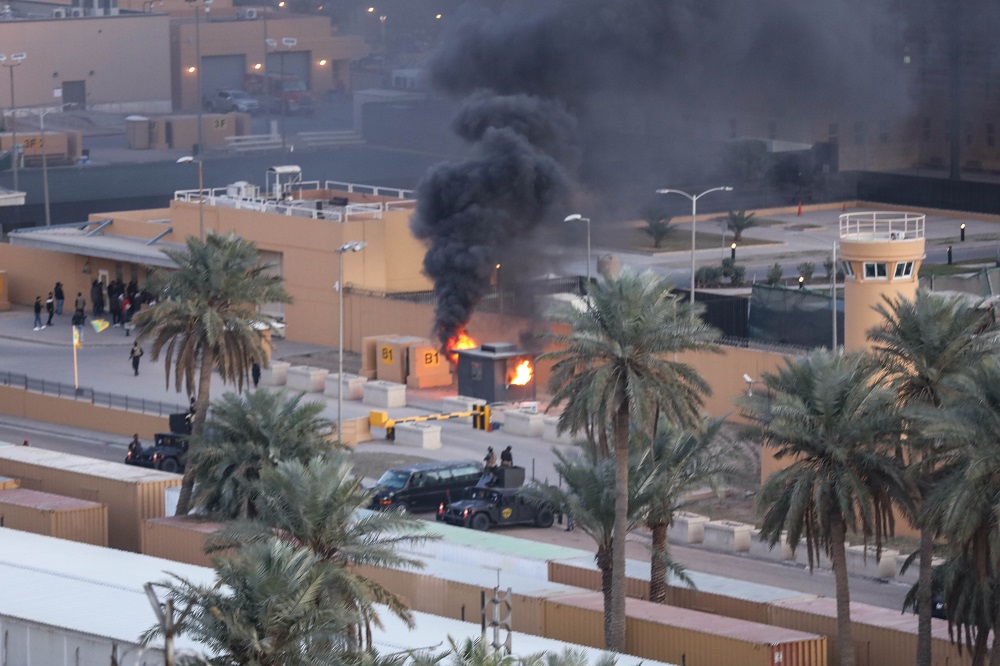
- ARAB NEWS
- 18 Jul 2025

Iraq is experiencing an escalation of armed violence between Iran-backed militias and US forces. The rocket attack that targeted a military base in Kirkuk, killing an American and injuring Americans and Iraqis, followed previous attempts targeting the vicinity of US military bases or the US embassy in Baghdad without resulting in injuries or casualties. But the latest attack crossed America’s declared red lines and exposed its personnel to a direct attack.
US forces launched “precision defensive strikes” against five facilities of the Hezbollah Brigades in Iraq and Syria, killing at least 25 people and injuring 51 others. As a result, the leaders and members of the Iran-affiliated Popular Mobilization Forces (PMF) attempted to ignite Iraqis against the US and threatened to carry out retaliatory military operations.
Protests were held outside the US embassy in the Green Zone on Tuesday. The outer fence of the embassy was set alight, and protesters attempted to break in, prompting Iraqi security forces to intervene. The most prominent leaders of the PMF and Hezbollah Brigades participated in this protest.
Why have these developments come about, and how are they linked to anti-government protests, discontent with the political elite as well as Iranian interference in Iraq? It is clear that Iran is very worried about the continuity of the protests that prevented it from appointing a prime minister affiliated with it.
These protests have also destroyed the facilities of its militias, its diplomatic and consulate headquarters, and affected its exports to Iraq, which is a serious danger to Iran’s influence in Iraq. By attacking the US military base, Iran wanted to shuffle the cards to achieve two goals, the first of which is to urge pro-Iran parties to exert pressure to end the protests — a major headache for the Iranian leadership — by convincing people that the country is at war with the US and the protests must stop.
Iran’s second goal is to pressure for removal of US forces from Iraq, close the embassy in Baghdad, and inflame Iraqi anger to provoke a US reaction, which would, consequently, bring Iraq back to the Iranian axis. The editor-in-chief of Iran’s Kayhan newspaper, Hossein Shariatmadari, in October called on Iraqis to occupy the US embassy in Baghdad.
It remains important to observe the developments that Iraq will experience in the next week to see which course the crisis will take.
Dr. Mohammed Al-Sulami
It seems the US was expecting escalation inside Iraq, but it could never ignore the attack, the crossing of red lines, and the undermining of its authority. A press release from the US Department of Defense emphasized there were unlikely to be long-term strikes against the PMF, and that the reactions of the US military depended on what the group did in the future. The press release was a truce with the PMF as it mentioned that the attacks came in response to repeated attacks by Hezbollah Brigades on Iraqi bases. It also stressed that Iran and its affiliated forces must stop their attacks against the US and coalition forces, and respect the sovereignty of Iraq to avoid any additional defensive actions by US forces.
That is why the only victim in this process will be the Iraqi civil movement because pro-Iran political forces in Iraq would have managed to shuffle the cards, especially after the attack on the embassy. Based on this, they will exert all pressure to end the anti-Iranian protest movement and make it seem like the reason has been the greater battle.
These developments can also lead to sympathies for PMF factions by the ruling political elite and the constituencies close to it.
A sympathy campaign has already appeared on social media and, most importantly, the former prime minister, Adel Abdul Mahdi, announced three days of mourning for those killed in the US military operation.
The decisive matter, however, will be the stance of Najaf authorities. On a political level, the strike will encourage the political elite to take positions that are far from Iran’s impositions regarding the nomination of the prime minister. That is because if many of the Iraqi elite sense that Iran cannot act in Iraq with complete freedom as it did before, their stances toward Iran will change.
It remains important to observe the developments that Iraq will experience in the next week to see which course the crisis will take, and the impact of these transformations in the Iraqi political scene on civil protests. Also, America’s calculations on how to deal with these developments, in light of the electoral climate that dominates the US political scene and the current administration, will contribute to determining the course of the crisis.
We count on the wise and patriotic people of Iraq to ensure their country does not fully turn into a battlefield for a proxy war between Iran and the US. Moreover, if the Iranian hegemony over Iraq returns more strongly than before, the future of the Iraqi people will be similar to the isolation, persecution and international sanctions that Iranian people suffer due to a war in which they have no stake.
Dr. Mohammed Al-Sulami is Head of the International Institute for Iranian Studies (Rasanah). Twitter: @mohalsulami